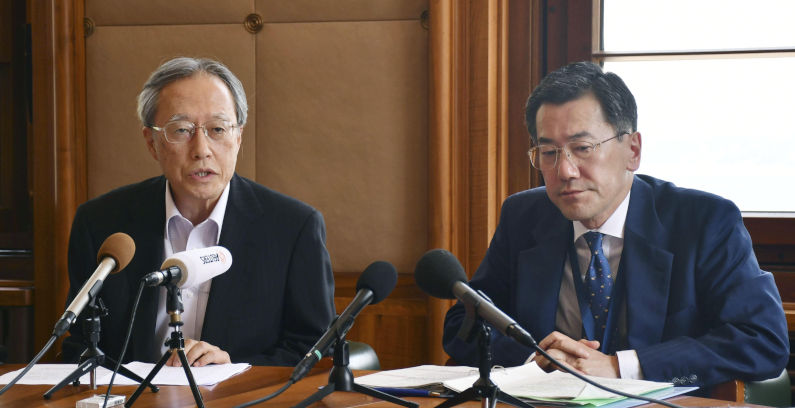Ambassador for war crimes denial
September 5, 2025
Arguably the most inflammatory Japanese diplomat ever despatched to Australia, former ambassador Yamagami Shingo, is at it again.
In a post on social media platform X, he’s attacked the BBC for a report chronicling the undeniable fact that Imperial Japan committed atrocities across much of Asia during World War II.
Coinciding with the 80th anniversary of Japan’s defeat in the war in the Pacific, BBC Tokyo correspondent, Shaimaa Khalil filed a one-minute video report chronicling the Japanese surrender, the nation’s rehabilitation to democracy and becoming a global economic powerhouse.
She also reported that, “The country has never fully confronted or acknowledged the atrocities committed by its Imperial Army in China, in Korea and across Asia.
“It’s a stark contrast to Germany’s reckoning with its Nazi past. The US too has never apologised for the atomic bombing of Hiroshima or Nagasaki.”
Unleash the wolves
That short report was too much for the enthusiastic social media poster Yamagami. In a post the following day, he wrote, “Punitive lecturing by this ignorant and self-righteous BBC reporter is utterly sickening. ‘Atrocities’? Did Imperial Japan try to annilate [sic] other race in an organised and planned manner?”
Far worse than Yamagami’s post were many of the comments that followed. One wrote, “Fake or untrue incidents such as the Nanjing Massacre and the comfort women issue are unacceptable accusations from China and Korea.” These two cases are very well documented and only disputed by a small group of leaders and fanatics in Japan.
One comment likened the report to “rubbish propaganda”, another wrote, of Japan’s imperial occupation of Asian countries, “During the occupation, despite a certain degree of arrogance, efforts were made to repair and improve infrastructure, and to proactively promote education beyond class distinctions by establishing universities and the like.” Well-documented instances of mass rape, the killing of millions of civilians and horrendous human experiments hardly fit this description.
Japan’s wartime atrocities are undeniable
At the post-war Tokyo War Crimes Tribunal, 28 high-ranking politicians and military leaders were prosecuted for war crimes. All but two were convicted; of those two, one had died before judgment and the other was found to be mentally unfit during the course of the trial.
The tribunal hardly had the teeth of the Nuremberg Trials that prosecuted Nazi war criminals in Germany. Seven of the 26 Japanese leaders convicted were sentenced to death, three died in prison, while 13 were granted parole after less than 10 years in prison — a number were released after just four years incarceration.
The list of crimes
The most publicised of Japanese war crimes was the Rape of Nanking (modern day Nanjing in eastern China), where, over a six-week period, more than 200,000 Chinese civilians were systematically slaughtered by Japanese forces. An estimated 20,000 women and children were raped by Japanese soldiers.
One of the greatest, but little known, atrocities across all theatres of World War II was that of Unit 731. A biological warfare and human experiments unit stationed in Harbin, China’s north, it committed horrendous crimes. Its activities included infecting prisoners with deadly diseases, conducting vivisection (live human dissections without anaesthetic), performing organ harvesting, testing hypobaric chambers, amputating limbs, and exposing victims to chemical agents and explosives.
Prisoners were mainly Chinese civilians, but also included Russians, Koreans, and others, including children and pregnant women. Estimates of deaths at the hands of this unit are as high as 300,000. Unlike the brutal Nazi death camps, there were no reported survivors of Unit 731.
A disgraceful footnote to the end of Unit 731 was that that the man who headed it, microbiologist Lieutenant General Shirō Ishii, escaped prosecution at the war crimes tribunal. Instead, he moved to the US and worked as an adviser on its biological weapons program.
Similar atrocities occurred across other Asian nations, including death marches in Thailand and massacres in Malaysia, Singapore and the Philippines. Then there were more than 200,000 women, mainly Korean, but also from other Asian nations, dehumanised and forced into sexual slavery to satisfy the brutal imperialists of the Japanese war machine.
More than 8000 Australian prisoners of war were either starved to death or executed.
At best, Yamagami believes Japan owes no apology for these war crimes; at worst, he denies they ever happened.
Australia’s anti-China hawks forgive the denial
While in Canberra — Yamagami was recalled in 2023 — he made a lot of friends in the “anti-China brigade”. He hosted at least one private dinner with then opposition leader Peter Dutton and entertained former prime ministers Tony Abbott and Scott Morrison at the embassy.
Other embassy guests included Australian Defence Force chief Angus Campbell, ASIO chief Mike Burgess and Office of National Intelligence director-general Andrew Shearer.
In an April 2023 Sky News Interview with Peta Credlin, where Abbott and Yamagami sat side-by-side, Abbott praised his style of backgrounding journalists and publicly letting fly with his contempt for China. The former prime minister said, “In this sense, Yamagami-san has been one of the really outstanding diplomats.”
An Australian Financial Review story in 2023 reported, “It would be very fair to say that Yamagami has made relationships with the incoming [Labor] government difficult,” one source in Tokyo said. “His narrative does not fit the narrative of the new government.”
Writing in his public policy website, Pearls and Irritations, Australia’s former ambassador to Japan, John Menadue, wrote that Yamagami’s style had caused ructions in the Japanese diplomatic corps and that he had been withdrawn. His sharp tongue and contempt for those who disagree with him has not.
The views expressed in this article may or may not reflect those of Pearls and Irritations.


